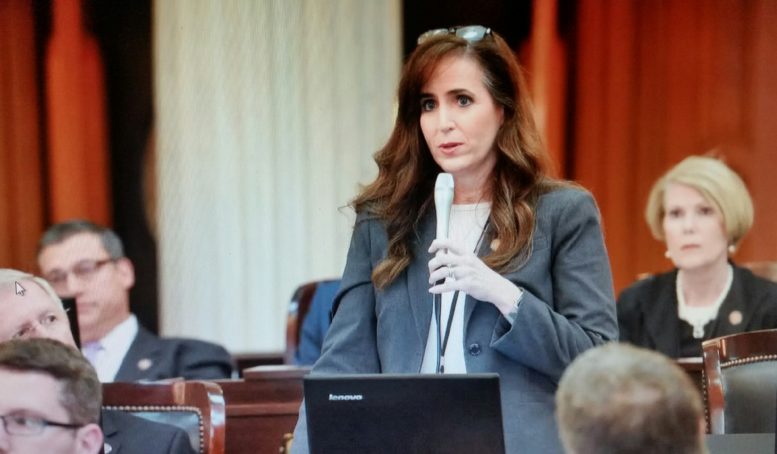By DAVID DUPONT
BG Independent News
State Rep. Theresa Charters Gavarone voted with the rest of the Ohio House Republicans to overturn 11 budget vetoes issued last week by Republican Gov. John Kasich.
While the House did not act on overriding a veto that would have frozen Medicaid expansion in the state, it did override a number of other Medicaid related vetoes.
The veto overrides now must go to the State Senate where they will need a three-fifths vote to pass.
Gavarone said she was felt particularly strongly about restoring money to counties that they were losing when the federal government said a tax for Medicaid providers could not be levied. That cost Wood County $900,000.
“This will partially restore some of that funding,” she said. The funding would stretch over the next six years.
State Senator Randy Gardner (R-Bowling Green) told Clint Corpe on “The Morning Show” Thursday that overriding that veto was his top priority as well.
The House also delayed plan to move behavioral treatment under Medicaid into managed care for six months. This was especially important to insure a continuity of treatment for those fighting opioid addiction, Gavarone said.
She also said it was important that the House restore the provision calling for Medicaid reimbursement rates to be set at 75-percent of the Medicaid allowable rates neonatal and newborn services. They are now 45 percent.
She said the move is revenue neutral.
In his veto message, Kasich said, the increase would force the state Medicaid program to lower rates for other services “to avoid an increase in Medicaid expenditures.” That could threaten access to those services and the provision limits the state Medicaid director’s ability “to efficiently and effectively manage the Medicaid program.”
That phrase appeared often in the veto message, attached to Medicaid-related items the House has subsequently overridden his vetoes on.
Gavarone said these overrides were a matter of combatting executive overreach and making sure elected representatives had a say in managing Medicaid.
Gavarone left open the door that the Medicaid expansion freeze and other items may come up again.
“There was a lot in there,” she said. Veto overrides can happen anytime within the two-year legislative session that begins in September.
In other action, Gavarone also voted in favor of a modification of the concealed carry law that lessens the penalties for carrying a weapon into a gun-free zone.
The change means that if a concealed carry permit holder carries a weapon into a gun-free zone they will not be charged. Instead they can be asked to leave. If they refuse to leave or return with a weapon within 30 days they can be charged with a fourth degree misdemeanor.
Gavarone said she’d heard from both sides on the issue with more in favor of the change.
She said it was similar to what the Transportation Safety Administration now does at airports.
“These are people who have been trained, taken classes, and fingerprinted,” she said. “Someone who accidentally crosses a threshold shouldn’t have their life ruined.”
Gavarone said the House has also passed a bill that she co-sponsored. House Bill 115 allows people to voluntarily provide information to a state registry so police know that there’s someone who may be driving or a passenger in a vehicle who may have difficulty communicating with the officer.
Gavarone said this was proposed on the recommendation of a woman in Walbridge. The woman has a concealed carry permit. She also has two sons on the autism spectrum. One is high functioning and drives, and the mother was concerned about any miscommunication if he was stopped and the officer was concerned about the possible presence of a weapon.
The bill, Gavarone said, provides another tool to protect both citizens and officers. “I’m looking forward to having it passed by the Senate and signed by the governor.”





